Defending Tenants, Protecting Landlords - Claim Expertise you can Trust...
Chat to us now to see how we can help >
Free Consultation with a Housing Expert
Welcome to Commitment to Housing Excellence
At the heart of a thriving community lies the foundation of secure and fair housing. We understand the critical importance of a safe and just living environment, which is why we are dedicated to improving housing conditions and ensuring justice for all.
Our Dual Focus: A Balanced Approach By addressing both sides of the tenant-landlord relationship, we maintain a balanced approach that benefits the entire community. Our dual focus allows us to navigate the complexities of housing laws with expertise and fairness. This unique perspective ensures that every voice is heard and every concern is addressed with professionalism and integrity.
Connect with us today – because everyone deserves a place they can proudly call home.
For Tenants
Are you dealing with disrepair in your rental home? Our team stands with you. We provide comprehensive support to tenants facing challenges in their homes. From leaky roofs to heating issues, no problem is too big or small for our attention. You deserve a habitable space that you can call home, and we are here to ensure that your rights are respected and upheld..
We understand that poor housing conditions can significantly impact the lives of all tenants, particularly women and families.
Our team of experienced solicitors is here to help you navigate the complexities of housing disrepair claims.
We work hard to ensure all repairs are undertaken to the highest standards and you receive the compensation you deserve.
For Landlords
For Landlords: Safeguarding Your Interests Landlords play an essential role in our community's housing dynamics. As such, protecting your property and interests from unfounded claims is paramount. We offer robust services designed to defend landlords against unjust accusations while promoting responsible tenancy.
With us by your side, you can rest assured that your property is not only an investment but also a testament to quality housing.
As a landlord, you deserve peace of mind knowing your property and reputation are safe.
We provide expert guidance to help you respond to spurious housing disrepair claims quickly and effectively.
Our goal is to ensure that legitimate concerns are addressed whilst safeguarding you against unjust allegations.
Why Choose Us
When it comes to Housing Disrepair, we are the leading specialists in providing legal services to both landlords and tenants in private, social or council housing situations.

Specialist Expertise
As dedicated housing disrepair solicitors, we have extensive knowledge and experience in this field, ensuring you receive top-tier legal support.

Advocacy for Better Housing
We passionately advocate for improved housing conditions for all tenants, with a particular focus on supporting women and families who face the greatest challenges.

Fairness for Good Landlords
We recognise that there are responsible landlords who genuinely care for their properties and tenants. Our mission is to protect them from unfounded claims that could tarnish their reputation.

Quality over Quantity
We don’t engage in high-volume claims; instead, we focus on working with individuals who genuinely need our help, providing personalised attention and tailored solutions for each case.

Compassionate Approach
Our team is committed to understanding your unique situation and providing compassionate support throughout the legal process.

Proven Track Record
We have a history of successful outcomes, demonstrating our commitment to achieving justice for tenants and protecting the interests of landlords.
services We Offer
For Tenants
Housing disrepair claims
Tenancy deposit claims
Breach claims
Legal advice and representation
Mediation services
Support for vulnerable tenants
For Landlords
Defence against disrepair claims
Legal consultation for property management
Mediation and dispute resolution
Risk assessment and prevention strategies
Your Specialist Housing Disrepair Team

Kelly Victoria Thorn

Nichola Turpin

Sarah Southworth
TESTIMONIALS
What Our Clients Are Saying
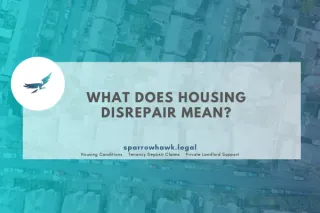
What Does Housing Disrepair Mean?
If you're a tenant, the term “housing disrepair” might sound a bit daunting, but it’s an important concept to understand—especially if you’re dealing with unresolved issues in your home. ...more
Housing Disrepair
January 17, 2025•3 min read
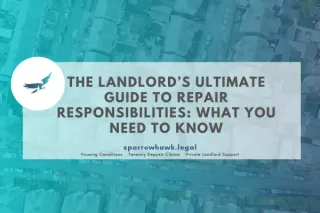
The Landlord’s Ultimate Guide to Repair Responsibilities: What You Need to Know
Being a landlord comes with a laundry list of responsibilities, and staying on top of property repairs is one of the most critical. ...more
Housing Disrepair
November 20, 2024•4 min read
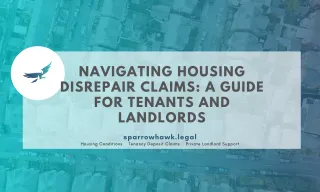
Navigating Housing Disrepair Claims: A Guide for Tenants and Landlords
Navigating the complexities of housing disrepair claims can be a daunting task for both tenants and landlords. ...more
Advice for Landlords ,Housing Disrepair
October 10, 2024•7 min read
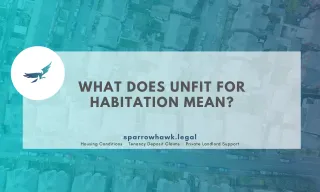
What does Unfit for Habitation Mean?
This is a judgment from a Circuit Judge about what it means for a home to be unfit for people to live in, based on specific laws. ...more
Housing Disrepair
October 01, 2024•2 min read
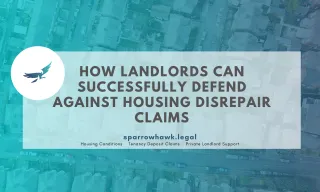
How Landlords Can Successfully Defend Against Housing Disrepair Claims
Housing disrepair claims can pose significant challenges for landlords, particularly in an era where tenant rights are increasingly protected. ...more
Advice for Landlords
October 01, 2024•2 min read
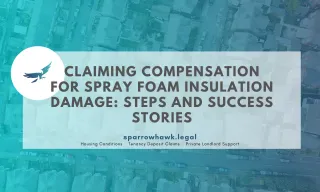
Claiming Compensation for Spray Foam Insulation Damage: Steps and Success Stories
Spray foam insulation has become a popular choice for many homeowners seeking to enhance energy efficiency, but it can sometimes lead to significant concerns, particularly for those who experience iss... ...more
Spray Foam Insulation Claims
September 29, 2024•8 min read
FAQ's
We hope this information is useful, but if you have any further questions, please contact us.
What services does Sparrowhawk Legal offer?
At Sparrowhawk Legal, we specialize in providing legal support for tenants facing housing disrepair issues and offering guidance to responsible landlords. Our services include dispute resolution, legal advice, and advocacy aimed at ensuring safe and comfortable living conditions.
How can I access your services if I live outside of your local area?
As a fully virtual practice, we serve clients nationwide. Our online consultations and services allow us to assist you no matter where you are located, ensuring you receive the support you need from the comfort of your home.
What should I do if I am facing housing disrepair issues?
If you are experiencing disrepair in your home, contact us for a consultation. Our team will listen to your situation, provide tailored advice, and guide you through the process of resolving your issues effectively.
How do you support landlords?
We offer responsible landlords tailored advice and support to help them manage their properties confidently. Our expertise ensures that landlords are equipped to handle disputes and protect themselves from unjust claims.
What makes Sparrowhawk Legal different from other legal services?
We pride ourselves on our empathetic approach, transparent communication, and commitment to keeping clients informed throughout the legal process. Our virtual format allows us to operate efficiently and reduce costs, passing the savings onto you.
Can I join the "Women and Family Tenant Support" Facebook group?
Yes! Our Facebook group is open to anyone seeking support related to housing challenges. It’s a safe space for sharing resources, experiences, and advice. We encourage you to join and connect with others facing similar situations.
Do you help tenants with private landlords?
Yes. Wherever possible we will always help clients who have private landlords. We also help the good private landlords out there who are being targeted by disreputable claims management companies.
How much do you charge?
Our fees are usually covered by a no win no fee agreement in respect of housing disrepair claims and our success fee is capped at 33%. For landlords we offer a tailored fee structure dependent on the complexity of the case and the stage of the matter.
How do I get started?
To get started, simply reach out through our website or contact us directly for an initial consultation. We’ll discuss your situation and how we can assist you in achieving the best possible outcome.
Sparrowhawk Legal Ltd | Registered in England and Wales | Registered Company No: 14507943 | Registered office: 5th Floor 167-169 Great Portland Street, London, W1W 5PF | Tel 0204 581 9300
Sparrowhawk Legal Ltd is authorised and regulated by the Solicitors Regulation Authority No. 8004127
Sparrowhawk Legal is a trading name of Sparrowhawk Legal Ltd.
© Copyright 2024. Sparrowhawk Legal. All rights reserved.
